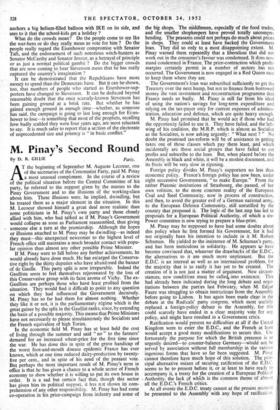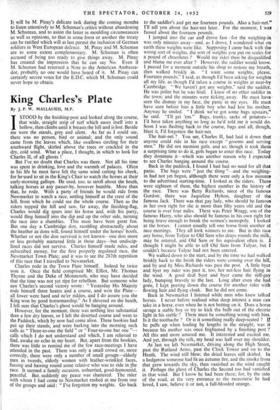M. Pinay's Second Round T the beginning of September M.
Auguste Lecoeur, one of the secretaries of the Communist Party, paid M. Pinay a most unusual compliment. In the course of a review of the political situation before the Central Committee of his party, he referred to the support given by the masses to the Pinay Government and to the illusions of the working-class about him. These illusions were, he implied, dwindling, but he treated them as a major element in the situation. In this M. Lecoeur showed himself a great deal more realistic than some politicians in M. Pinay's own party and those closely allied with him, who had talked as if M. Pinay's Government would collapse as soon as Parliament reassembled, thus giving - someone else a turn at the premiership. Although the hopes or illusions attached to M. Pinay may be dwindling—as indeed they must—this unexpected newcomer to the highest level of French office still maintains a much broader contact with popu- lar opinion than almost any other possible Prime Minister.. If M: Pinay were to fall before any further achievements, he would already have done much. He has enlarged the Conserva- tive right by the thirty deputies who have abandoned the banner of de Gaulle. This party split is now irreparable. Indeed the Gaullists seem to feel themselves rejuvenated by the loss of this Conservative group with its faint aroma of Vichy. The ex- Gaullists are perhaps those who have least profited from the situation. They would find it difficult to point to any question on which they had influenced the Government decisively. M. Pinay has so far had them for almost nothing. Whether they like it or not, it is the parliamentary regime which is the great gainer by the split in the Gaullist ranks, since, by extending the basis of a possible majority. This means that Prime Ministers have not necessarily to please simultaneously the Socialists and the French equivalent of high Tories. In the economic field M. Piney- has at least held the cost of living. through the summer and said " no " to the farmers' demand for an increased wheat-price for the first time since the war. He has done this in spite of the grave handicap of the worst foot-and-mouth disease epidemic France has ever known, which at one time reduced dairy-production by twenty- five per cent., and in spite of his need of the peasant vote. But perhaps the most important result of M. Pinay's term in office is that he has given a chance to a whole sector of French economy to show whether it is willing to put its own house in order. It is a sad but certain fact that, though this sector • has given him its political support, it has not shown its com- prehension of any other responsibility. M. Pinay has had some co-operation in-his price-campaign from industry and some of the big shops. The middlemen, especially of the food trades, and the smaller shopkeepers have proved totally uncompre- hending. The peasants could not perhaps do much about prices in shops. They could at least have backed the Government loan. They did so only to, a most disappointing extent. M. Pinay warned them repeatedly that a liberalism that did not work out in the consumer's favour was condemned. It does now stand condemned in*France. The price-contraction which profit- margins certainly permit in a number of sectors has not occurred. The Government is now engaged in a Red Queen race to keep them where they are.
The Government's loan was subscribed sufficiently to get the Treasury over the next hump, but not to finance from borrowed money the vast investment and reconstruction programme that France needs so badly. M. Pinay is still far from his ideal of using the nation's savings for long-term expenditure and relying on the tax-payer only for current expenses of adminis- tration, education and defence, which are quite heavy enough. M. Pinay had promised that he would act if those who had the opportunity failed to use it. They have failed, and the left- wing of his coalition, the M.R.P. which is almost as Socialist as the Socialists, is now asking urgently : " What next ? " No doubt the promised tax-reform will be of assistance in getting taxes out of those classes which pay them least, and which incidentally are those social groups that have failed to cut profits and subscribe to the loan. But, when placed before the Assembly in black and white, it will be a modest document, and its fruits will be very slow in ripening.
Foreign -policy divides M. P.inay's supporters no less than economic policy. France's foreign policy has now been, under eight successive Governments, " to make Europe." From the rather Platonic institutions of Strasbourg, she passed, of her own. volition, to the more concrete reality of the European Coal and Steel Community, now in process of construction, and then, to avoid the greater evil of a German national army, to the- European Defence- Community, still .unratified by the country that proposed it. The logic of the last step has led to proposals for a European Political Authority, of which a six- Power committee is now trying to prepare a blue-print.
M. Pinay may be- supposed to have had some doubts about this policy when he first formed fiis Government, for it had not originally been his intention to include in it M. Robert Schuman. He yielded to the insistence of M. Schuman's party, and has been meticulous in solidarity. He appears to have become convinced that, whatever the drawbacks of the' E.D.C., the alternatives to it are much more unpleasant. But the E.D.C. is an internal as well as an international problem, for the majority that is to ratify it has yet to be created. The creation of it is not just a matter of argument. New circum- stances, new conditions must be called. into existence. This had already been indicated during the long debate and nego- tiations between the parties last February, when M. Edgar Faure was struggling to obtain instructions from the Assembly before going to Lisbon. It has again been made clear in the debate at the Radicals' party congress, which most usefully replaced a foreign-policy debate in the Assembly, for this could scarcely have ended in a. clear majority vote for any policy, and might have resulted in a. Government crisis.
Ratification would present no difficulties at all if the United Kingdom were, to enter the E.D.C., and the French at least would accept a good many modifications to secure this. Un- fortunately the purpose for which the British presence is so urgently desired—to counter-balance Germany—would not be served by association without full membership in the various ingenious forms that have so far been suggested. M. Pinay cannot therefore have much hope of this solution. The prin- cipal alternative means of securing ratification of the E.D.C. seems to be to present before it, or at least to have ready to accompany it, a treaty for the creation of a European Political Authority, the lack of which is the common theme of almost all the E.D.C.'s French critics.
At all events the. E.D.C. treaty cannot at the present moment be presented to the Assembly with any hope of ratification- . It will be M. Pinay's delicate task during the coming months to listen attentively to M. Schuman's critics without abandoning M. Schuman, and to assist the latter in moulding circumstances as well as opinions, so that in some form or another the treaty can be ratified which will at last permit the inclusion of German soldiers in West European defence. M. Pinay and M. Schuman 'are to some extent complementary. M. Schuman is often accused of being too ready to give things away. M. Pinay has created the impression that he can say No. Even if M. Schuman had returned a Note to the American Ambassa- dor, probably no one would have heard of it. M. Pinay can certainly secure votes for the E.D.C. which M. Schuman could never hope to obtain.



































 Previous page
Previous page